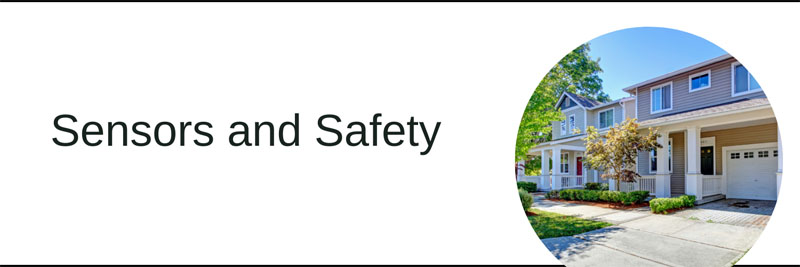When you think of a home or business security system, you might think of window and door sensors. However, there are other sensors that can be integrated into your security system to improve your safety and security.
Smoke detectors
Smoke alarms are essential for a home or business. According to the National Fire Protection Association, 50% of all fatal home fires occur while people are sleeping. When there is a fire, these alarms detect smoke particles and can warn you before you even smell the smoke, so you and your family can get out of the home safely. When integrated into a monitored security system, the fire department will be notified of a fire, even if you are away from home.
Heat Sensors
Heat detectors differ from smoke alarms as they respond to high temperatures, not smoke particles, making them an ideal sensor for garages, attics, or commercial environments that are dusty or have exhaust fumes that could cause false alarms by a smoke detector. Fires that start in these areas are often not quickly detected and can be devastating. When the heat alarm is connected to your home security system, the smoke alarms will go off if the heat sensor is triggered, and if your system is monitored, call the fire department.
Heat sensors are recommended if you use many Lithium-ion batteries – in fact, some insurance companies are requiring homeowners to have a monitored security system with a smoke/heat sensor in the garage if an EV charger is installed.
Motion sensors
These sensors detect movement and can trigger alarms by sending a signal to your security system that an intruder is detected. This sets off the alarm, and if your system is monitored, it alerts the monitoring center to a potential threat in your home.
Glass break detectors
These are set to detect the frequency of the sound of breaking glass, they will set off the alarm. This lets you know if an intruder is trying to enter your home by breaking a window or glass door.
Gas Detectors
Carbon monoxide detectors are recommended by the National Fire Prevention Association (NFPA). Large amounts of CO can overcome a person in minutes, causing them to lose consciousness and suffocate. The gas has no odor, color, or taste – it cannot be detected by the senses, so detectors are a good idea to protect your family and pets.
Leak detection
Water sensors detect leaks from appliances and water pipes, preventing or limiting damage. It’s a growing problem; according to the American Insurance Association, water damage claims have been growing faster than any other component of homeowners insurance. Adding a water leak detector to your security system can alert you if this happens – our monitored smart system can even turn off a water shutoff to minimize damage.
Specialized sensors and monitoring systems
Secur-Tek can design specialized systems to fit specific needs. For instance, if you need to monitor elderly parents, systems can be set up to send notifications when they get up out of bed, open the medicine cabinet, or when there is no activity in the home for a period of time.
To learn more about how a security system with sensors can improve your safety and peace of mind, call Secur-Tek at 919-387-1800 or fill out the form below.
Resources

